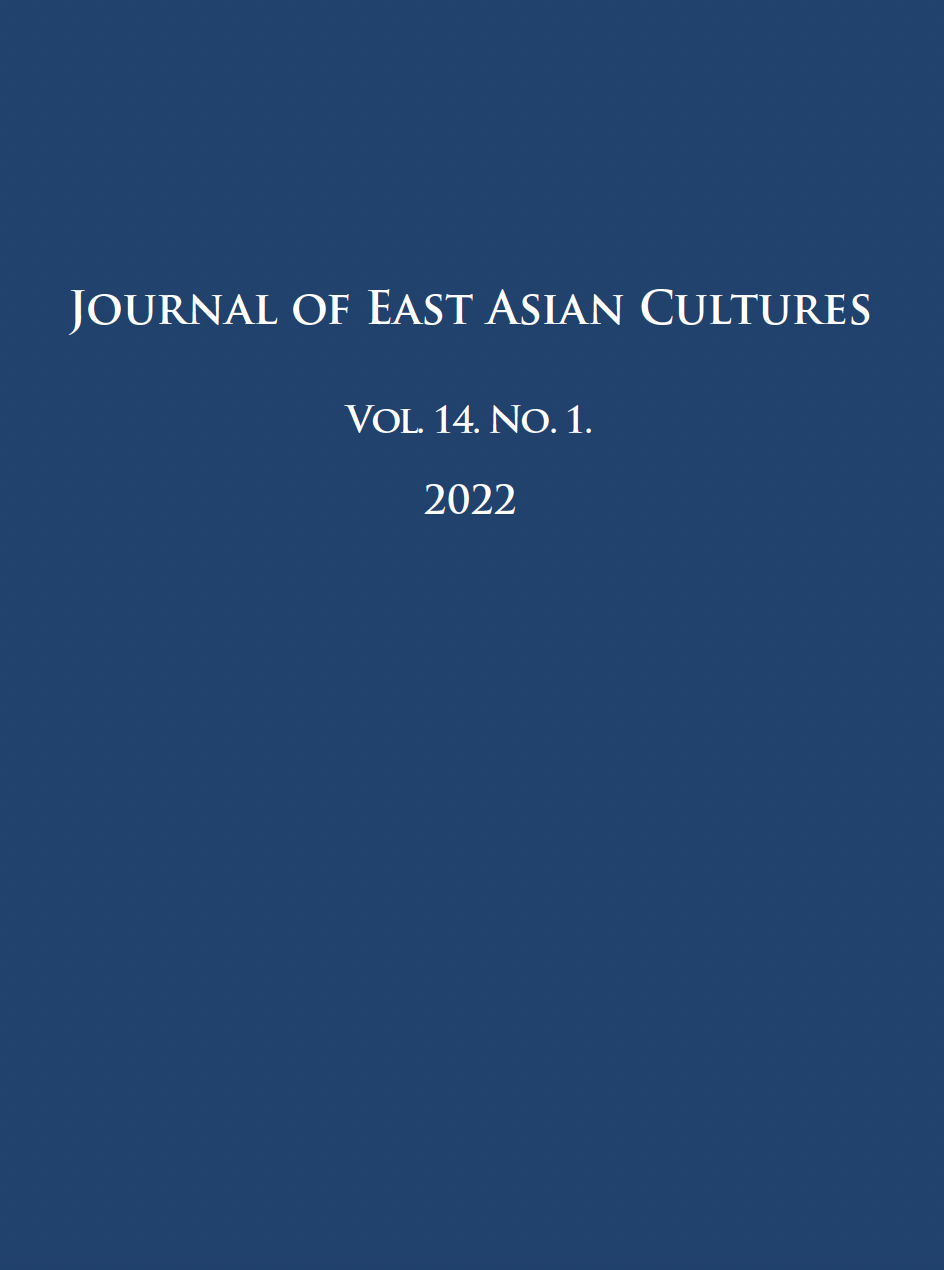On the Formation of the Public Condemnation of Epoch-making Korean Poet Sŏ Chŏngju – With a Focus on Pro-Japanese Collaboration
Published 2022-11-22
Keywords
- Sŏ Jŏngju,
- Korean poetry,
- Korea under Japanese rule,
- pro-Japanese collaboration,
- chinilpa
- I Kwangsu ...More
How to Cite
Copyright (c) 2022 Janka Kovács

This work is licensed under a Creative Commons Attribution-NonCommercial 4.0 International License.
Abstract
Sŏ Chŏngju is no doubt one of the most significant poets of 20th century Korean literature. However, his figure is shrouded in controversies originating from his political choices in life. The first of these controversies is his being a ‘pro-Japanese collaborator’ during the Japanese colonial period. The purpose of this study is to move beyond the accusation of Sŏ Chŏngju being an collaborator to map the settings of the colonial background in which he lived and wrote, while also comparing his situation with that of the famous writer, I Kwangsu. Another goal of the study is to examine the approach to his figure and works in recent times. This is for the sake of gaining a deeper understanding of the important poet, who very often is cast away by the superficial criticism of his being a ‘collaborator’.
References
- I Kwangsu 이광수 1972. Ch’inilp’aŭi pyŏn (I Kwangsu chŏnjip 7.) 친일파의 변(이광수 전집 7.) [The pro-Japanese side (I Kwangsu’s Complete Works 7.)]. Sŏul: Samchungtang.
- I Sŭngha 이승하 2020. Sŏ Chŏngju rŭl mudŏmesŏ kkŏnaeŏ pugwanchʼamsihara 서정주를 무덤에서 꺼내어 부관참시하라 [Lift Sŏ Chŏngju out of his grave and posthumously execute him].” Practical Literature. 6: 25–31.
- Brother Anthony of Taizé (ed.) 2005. Twentieth-Century Korean Literature. Norwalk: EastBridge.
- Brother Anthony of Taizé (ed.) 2015. The Colors of Dawn: Twentieth Century Korean Poetry. Honolulu: University of Hawaii Press.
- De Ceuster, Koen 2001. “The Nation Exorcised: The Historiography of Collaboration in South Korea.” Korean Studies. 25.2: 207–242. https://doi.org/10.1353/ks.2001.0015
- Hyun, Theresa 2004. Writing Women in Korea: Translation and Feminism in the Colonial Period. Honolulu: University of Hawai’i Press. https://doi.org/10.1515/9780824843540
- Kagan, Shelly 1998. Normative Ethics. Oxfordshire: Routledge.
- Kang, Inhan 강인한 2019. Sŏ Chŏngju siinŭi 「Songjŏng Ojang Songga」haesŏl “서정주 시인의「송정오장 (松井伍長) 송가 (頌歌)」해설 [The interpretation of poet Sŏ Chŏngju ’s The Song of Corporal Matsui].” Daum Cafe. https://m.cafe.daum.net/poemory/H5qF/4416? (last accessed: 2022.01.27.).
- Kim, Hŭiman 김희만. “Sŏ Chŏngju 서정주.” Encyclopedia of Korean Culture http://encykorea.aks.ac.kr/Contents/Item/E0071543 (last accessed: 2022.01.27.).
- Kim, Sŏkchun 김석준 2010. Sŏ Chŏngju ranŭn irŭmŭi pʼarŭmakʼon “서정주라는 이름의 파르마콘 [The pharmacon of the name Sŏ Chŏngju ].” Lyric Poetry Quarterly 20.3: 230–238.
- Kim, Sunbok 김순복. “Chunganggodŭnghakkyo 중앙고등학교.” Encyclopedia of Korean Culture http://encykorea.aks.ac.kr/Contents/Item/E0053825 (last accessed: 2022.09.07.)
- Kim, Uch’ang 1970. “Sorrow and Stillness: A View of Modern Korean Poetry.” Korea Journal 10.6: 12–21.
- Kyu, Hoyŏm 1992. “Japanese Press Policy in Colonial Korea.” Journal of Asian History 26.2: 140–159.
- Kwŏn, Nayŏng Aimee 2015. Intimate Empire. Durham: Duke University Press.
- Kwŏn Yŏngmin 1998. A history of the Korean proletarian literary movement. Sŏul: Munye ch’ulp’ansa.
- Lee, Peter H. 1965. Korean Literature: Topics and Themes. Arizona: University of Arizona Press.
- McCann, David R. 2004. The Columbia Anthology of Modern Korean Poetry. New York: Columbia University Press.
- Osváth, Gábor 2016. A koreai irodalom rövid története [A Short History of Korean Literature]. Budapest: ELTE Eötvös Kiadó.
- Pak, Sunyŏng 2009. “Everyday Life as Critique in Late Colonial Korea: Kim Namch'ŏn's Literary Experiments, 1934–43.” The Journal of Asian Studies 68.3: 861–893. https://doi.org/10.1017/S0021911809990088
- Pak, Yŏnjun 박연준 2019. [Tasi ponda, kojŏn] Sinŭn chalmosi ŏpta… Sŏ Chŏngju rŭl miwŏhamyŏnsŏ ikcha “다시 본다, 고전–시는 잘못이 없다… 서정주를 미워하면서 읽자 [Looking again, it is a classic–The poems are innocent… read them while hating Sŏ Chŏngju ].” Hankook Ilbo. https://www.hankookilbo.com/News/Read/201910241624785863 (last accessed: 2022. 01. 27.).
- Pak, Yuha 박유하 2008. Victims of Japanese Imperial Discourse: Korean Literature Under Colonial Rule. The Asia-Pacific Journal 6.10.
- Po, Umŏn 보우먼 2015. Ch’inil munhakkadŭrŭi manhaeng che 2 p’yŏn – Sŏ Chŏngju “친일 문학가들의 만행 제2편 – 서정주 [The atrocities of pro-Japanese writers Part 2 – Sŏ Chŏngju ].” Naver Blog. https://m.blog.naver.com/PostView.nhn?blogId=dongSŏk555&logNo=220256318292&proxyReferer=https:%2F%2Fwww.google.com%2F (last accessed: 2022. 01. 27.).
- Shin, Michael D. 2018. Korean National Identity Under Japanese Colonial Rule. Oxon: Routledge. https://doi.org/10.4324/9781315544717
- Sŏ, Yunsu서윤수. “Koch’anggodŭnghakkyo고창고등학교” Encyclopedia of Korean Culture http://encykorea.aks.ac.kr/Contents/Index?contents_id=E0003971 (last accessed: 2022.09.07.)
- Treat, John Whittier 2012. “Choosing to Collaborate: I Kwang-su and the Moral Subject in Colonial Korea.” The Journal of Asian Studies 71.1: 81–102. https://doi.org/10.1017/S0021911811002956

